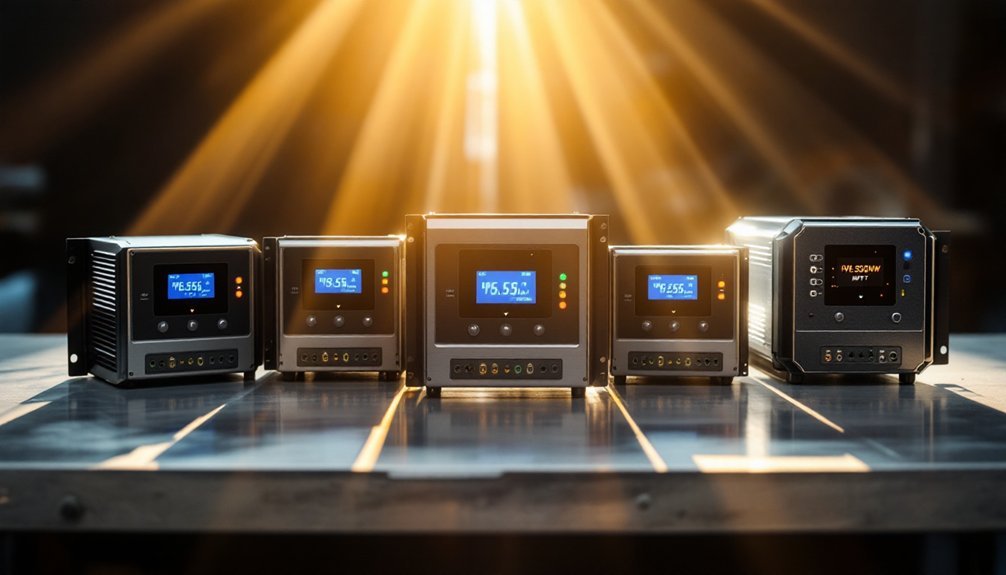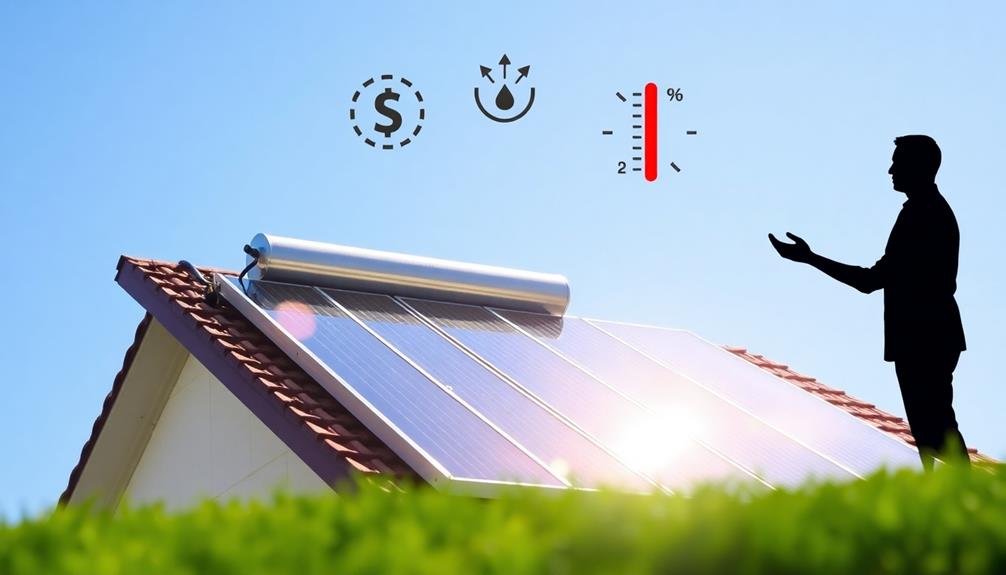As you explore solar power solutions, you'll quickly discover that a reliable charge controller is the heart of any efficient solar system. Whether you're powering a small cabin or managing a complex off-grid setup, choosing the right controller can mean the difference between ideal performance and wasted energy. From basic PWM models to sophisticated MPPT technology, these seven top performers of 2025 will help you navigate the vital features that matter most for your specific needs.
LiTime 60 Amp MPPT Solar Charge Controller
The LiTime 60 Amp MPPT charge controller stands out as an ideal choice for advanced solar setups requiring multi-voltage flexibility. You'll get impressive performance with its 99% tracking efficiency and 96% conversion rate, supporting 12V, 24V, and 48V systems.
The LCD display lets you monitor your system's performance, while built-in protections guard against common issues like overpower and short circuits. You'll need to use 6-gauge wire for peak performance and pay attention to temperature management. While the controller works with both LiFePO4 and lead-acid batteries, you'll want to carefully follow installation guidelines, especially when connecting the temperature sensor for lead-acid setups.
Best For: DIY solar enthusiasts and off-grid system builders who need a versatile charge controller capable of handling multiple voltage systems and battery types with professional-grade efficiency.
Pros:
- High efficiency with 99% MPPT tracking and 96% conversion rate
- Versatile compatibility with 12V, 24V, and 48V systems and multiple battery types
- Comprehensive protection features and LCD display for system monitoring
Cons:
- Requires careful attention to proper wire gauge and installation requirements
- Some users report issues with performance in high-temperature conditions
- Potential disconnection concerns with lithium batteries require careful setup
Renogy 40A MPPT Solar Charge Controller with Bluetooth (Rover 40A)
Ideal for both novice and experienced solar enthusiasts, Renogy's 40A MPPT Solar Charge Controller offers impressive versatility with its automatic 12V/24V detection and compatibility across multiple battery types. You'll benefit from its advanced 4-stage charging for lead-acid batteries and 2-stage for lithium, with up to 99% tracking efficiency.
The controller's built-in safety features protect against common issues like reverse polarity and overcharging, while the Bluetooth capability lets you monitor your system through the Renogy DC Home App. Despite mixed customer service reviews, the unit's performance in cloudy conditions and silent operation make it a solid choice for your solar setup.
Best For: Solar power enthusiasts seeking a versatile, high-efficiency charge controller for medium-sized off-grid systems who want advanced features like Bluetooth monitoring and multi-battery compatibility.
Pros:
- High efficiency with 99% tracking and 98% conversion rates, maximizing solar panel output
- Comprehensive protection features including reverse polarity, overcharging, and short circuit protection
- Flexible compatibility with multiple battery types and automatic 12V/24V system detection
Cons:
- Inconsistent customer service experiences and support issues reported by users
- Some customers received damaged or previously used products
- Setup process can be challenging for beginners, especially without adequate technical support
Victron Energy SmartSolar MPPT Solar Charge Controller (100V/30A)
Power users seeking professional-grade solar charging will find their match in Victron Energy's SmartSolar MPPT Controller. With its 100V/30A capacity and 12/24V system compatibility, you'll maximize energy harvesting even in partial shade conditions.
The VictronConnect app delivers real-time monitoring, 30-day performance tracking, and customizable settings through Bluetooth. You can sync multiple controllers to optimize your system's energy flow and leverage intelligent load output for direct device powering.
While it lacks a built-in display, the controller's 4.8-star rating from over 2,000 users confirms its reliability. You're getting industrial-quality construction backed by a 2-year warranty and robust app support.
Best For: Professional solar power users and off-grid enthusiasts requiring high-efficiency charging capabilities with advanced monitoring features for 12/24V systems.
Pros:
- Highly efficient MPPT technology that maximizes solar energy harvesting even in partial shade
- Robust smartphone app with comprehensive monitoring and customization options
- Multiple controllers can be synchronized for optimized system performance
Cons:
- No built-in display for direct device monitoring
- Bluetooth connectivity can experience occasional lag issues
- Advanced features require additional Victron products for full functionality
Renogy Wanderer 10A Solar Charge Controller
Built for versatility and budget-conscious consumers, Renogy's Wanderer 10A charge controller offers essential solar charging management at an entry-level price point. You'll get automatic voltage detection and extensive protection features, including safeguards against overcharging and short-circuiting.
While it's less efficient than MPPT controllers, the PWM technology monitors your battery voltage and adjusts charging accordingly. You can track performance through the LCD display or connect the optional BT-1 Bluetooth module for smartphone monitoring. Despite some user-reported error codes and manual clarity issues, you'll find it's easy to install and includes convenient features like USB ports and programmable load control modes.
Best For: Budget-conscious DIY solar enthusiasts and small off-grid system owners who need basic charging functionality and battery protection for setups under 130W.
Pros:
- Comprehensive protection features including overcharging, short-circuit, and reverse polarity protection
- User-friendly installation with clear LCD display and optional Bluetooth monitoring
- Versatile battery compatibility including AGM, Gel, Flooded, and Lithium batteries
Cons:
- Less efficient PWM technology compared to MPPT controllers
- Some users report frustrating error codes and reliability issues
- Manual lacks clear instructions for certain settings, particularly for lithium battery configuration
100A MPPT Solar Charge Controller with LCD Display
Professional installers and DIY enthusiasts seeking maximum control over their solar charging system will appreciate the ELUSH 100A MPPT controller's versatile capabilities. You'll get exceptional efficiency with its 99.5% tracking rate and compatibility with multiple battery types across 12V-48V systems.
The backlit LCD display shows you real-time data on charging status, battery voltage, and system temperature. You're protected by extensive safety features including over-voltage, reverse connection, and overheating safeguards. While the controller offers advanced functionality through seven operating modes, you'll need to navigate around its less-than-stellar documentation. For best results, remember to connect your battery before the solar panels during installation.
Best For: Solar power system owners requiring a high-capacity charge controller with advanced monitoring capabilities for medium to large installations up to 100A who want flexibility across different battery types and voltage systems.
Pros:
- Highly efficient MPPT technology with 99.5% tracking rate and support for multiple voltage systems (12V-48V)
- Comprehensive LCD display showing real-time operational data and system status
- Extensive built-in protection features and multiple operating modes for versatile applications
Cons:
- Poor documentation and unclear installation instructions
- Mixed customer feedback regarding long-term reliability
- Must follow specific connection sequence (battery before solar panels) for proper operation
Victron SmartSolar MPPT Solar Charge Controller (Bluetooth)
The Victron SmartSolar MPPT stands out as a tech-savvy controller designed for solar enthusiasts who want precise monitoring and control of their system. With its 75V/15A capacity and 12/24-volt compatibility, you'll get optimized battery performance through intelligent charging algorithms.
You can monitor real-time data and adjust settings through the VictronConnect app via Bluetooth, while the controller's fast tracking guarantees maximum power output even in partial shade. It's versatile enough to handle multiple panel configurations, whether in series or parallel. Though the load output capacity has limitations, you'll appreciate the automatic disconnection feature that protects your batteries from over-discharge.
Best For: Solar power enthusiasts and DIY installers seeking a sophisticated, Bluetooth-enabled charge controller with detailed monitoring capabilities for small to medium-sized solar setups.
Pros:
- Advanced MPPT technology with fast tracking ensures maximum power output even in partial shade conditions
- Comprehensive monitoring and control through user-friendly Bluetooth app interface
- Flexible installation options with support for multiple panel configurations and synchronized charging
Cons:
- Limited load output capacity may require upgrading for larger systems
- Maximum wire size of 10 AWG might restrict some installation scenarios
- Some users report unclear manual instructions and documentation
SOLPERK 8A 12V Solar Charge Controller with LED Display
Outdoor enthusiasts seeking a reliable solar charging solution will appreciate SOLPERK's 8A 12V controller. This waterproof unit protects against harsh weather while offering intelligent LED display monitoring of your charging status.
You'll find six essential safety features, including reverse polarity and overcharging protection, making it ideal for 12V solar panels and various battery types like LiFePO₄, AGM, and GEL. The SAE connector guarantees quick installation – just connect red to positive and black to negative.
While some users report minor setup challenges, SOLPERK's 24/7 customer service and one-year warranty provide peace of mind. The controller's zero nighttime power consumption and automatic battery recognition make it a smart choice for RVs, boats, and trailers.
Best For: Outdoor and recreational vehicle owners looking for a reliable, weatherproof solar charge controller for their 12V battery systems, particularly those with RVs, boats, or trailers.
Pros:
- Comprehensive safety features including six different types of protection
- 100% waterproof design makes it suitable for all weather conditions
- Easy installation with SAE connector and clear LED display for monitoring charging status
Cons:
- Limited to 8A maximum current, which may not be sufficient for larger solar systems
- Some users report confusion with installation instructions and wire polarity
- Mixed reviews regarding customer service response times and warranty claims
Factors to Consider When Choosing the Most Reliable Solar Charge Controllers
Selecting the right solar charge controller requires you to match your battery type compatibility and evaluate your power rating requirements before making a purchase. You'll need to decide between MPPT and PWM technology, with MPPT offering higher efficiency but at a greater cost, while also checking for vital protection features like overcharge and short-circuit safeguards. Your installation environment plays a significant role too, as factors like temperature, humidity, and exposure to elements will influence which controller can best withstand your specific conditions.
Battery Type Compatibility
When choosing a solar charge controller, battery type compatibility stands as a critical factor that can make or break your system's performance. You'll need to verify your controller supports your specific battery chemistry, whether you're using Lead-acid, Lithium (LiFePO4), or Gel batteries.
Modern charge controllers offer adjustable settings to match different battery types' unique charging requirements and voltage characteristics. If you're using lithium batteries, you'll want a controller that manages their distinct bulk and absorption stages effectively. For maximum flexibility, consider controllers that support multiple battery types, especially if you plan to upgrade or mix battery technologies in the future. Don't forget to check for temperature sensor compatibility, particularly with Lead-acid batteries, as temperature changes can greatly impact charging efficiency and battery life.
Power Rating Requirements
The power rating of your solar charge controller serves as a crucial foundation for system reliability and performance. You'll need to match the controller's power specifications with your solar panel system's total wattage to prevent overload issues and maintain peak charging efficiency.
Start by checking the controller's current rating, which should adequately handle your panels' amp output. Whether you're looking at 10A, 30A, or 60A models, select one that exceeds your system's maximum current. Don't forget to verify voltage compatibility with your battery setup, as controllers come in 12V, 24V, and 48V configurations. You'll also want to verify the controller's maximum input voltage rating surpasses your panels' open circuit voltage. For top performance, look for tracking efficiency ratings of 99% or higher to maximize energy capture in varying conditions.
MPPT Vs PWM Technology
Modern solar charge controllers offer two distinct technologies: MPPT and PWM, each with unique advantages for different applications. If you're seeking maximum efficiency, MPPT controllers deliver impressive tracking efficiencies up to 99% and conversion rates of 96-98%, markedly outperforming PWM alternatives.
You'll find MPPT controllers particularly valuable for larger solar arrays and high-voltage panels, as they automatically adjust to varying voltage levels and optimize energy transfer. While PWM controllers regulate charging through on-off switching, they're less efficient, especially in partial shade conditions. Though you'll pay more upfront for MPPT technology, the investment often pays off through superior performance and energy harvesting. Consider MPPT if you're building an off-grid system or need maximum power output, while PWM might suffice for smaller, budget-conscious setups.
Protection Features Assessment
Selecting a solar charge controller with robust protection features proves essential for safeguarding your investment and ensuring system longevity. You'll want to prioritize controllers that offer extensive protection against over-voltage, over-current, short circuits, and reverse polarity. These features work together to prevent costly damage to your batteries and solar components.
Look for models with built-in overheating protection, especially if you're installing in high-temperature areas. Smart controllers with self-diagnostic capabilities will help you quickly identify and resolve issues through error code systems. Don't overlook the importance of overcharge and deep discharge protection, as these directly impact your battery's lifespan. For outdoor installations, you'll need a controller with proper weather-resistant or waterproof ratings to withstand environmental challenges and maintain reliable performance year-round.
Installation Environment Considerations
Beyond robust protection features, successful solar charge controller implementation hinges on careful assessment of your installation environment. You'll need to evaluate temperature extremes in your area, as both excessive heat and cold can affect your controller's performance and lifespan.
If you're planning an outdoor installation, choose a controller with proper IP-rated waterproofing and dustproofing to withstand weather challenges. Guarantee your mounting location provides adequate ventilation for heat dissipation, and select controllers with built-in cooling structures for high-temperature environments. Always mount your controller on non-combustible surfaces to prevent fire risks.
Don't overlook wire gauge selection – it's essential for minimizing voltage drops, especially in long-distance installations. The right gauge will optimize your system's efficiency and protect against performance losses in high-current applications.
Brand Track Record
When evaluating solar charge controllers, a manufacturer's brand track record serves as a crucial indicator of product reliability and long-term performance. You'll want to examine customer ratings and reviews to gauge real-world experiences with the product. Look for brands that consistently maintain high satisfaction scores and positive feedback.
Consider manufacturers that have stood the test of time and offer extensive warranty coverage. A strong commitment to customer service, including responsive support channels, shows the brand's dedication to your success. You should also pay attention to brands that prioritize innovation through research and development, as this often translates to more reliable products.
Don't forget to verify industry certifications and safety standards. Brands that meet or exceed these requirements demonstrate their commitment to quality and give you added confidence in their reliability.
Frequently Asked Questions
How Often Should I Clean and Maintain My Solar Charge Controller?
You'll need to inspect your charge controller monthly and clean dust from its vents. A thorough maintenance check every 3-6 months guarantees peak performance. Wipe terminals and check connections quarterly for corrosion.
Can I Use Multiple Charge Controllers in a Single Solar System?
Yes, you can use multiple charge controllers in your solar system. You'll need to connect them in parallel to different solar arrays. This setup helps manage larger systems and provides redundancy if one controller fails.
What Happens to the Controller During Lightning Strikes or Power Surges?
Without proper protection, your charge controller can get damaged or destroyed during lightning strikes and power surges. You'll want to install surge protectors and lightning arrestors to safeguard your controller against these electrical threats.
Are Solar Charge Controllers Waterproof for Outdoor Installation?
Most solar charge controllers aren't waterproof and shouldn't be installed outdoors. You'll need to mount your controller in a weatherproof enclosure or indoor location to protect it from rain, moisture, and environmental damage.
Can I Upgrade My Charge Controller's Firmware for Better Performance?
You can upgrade firmware on many modern charge controllers through USB ports or manufacturer apps. However, it's not available on all models. Always check your controller's manual and only use official firmware updates.




Leave a Reply